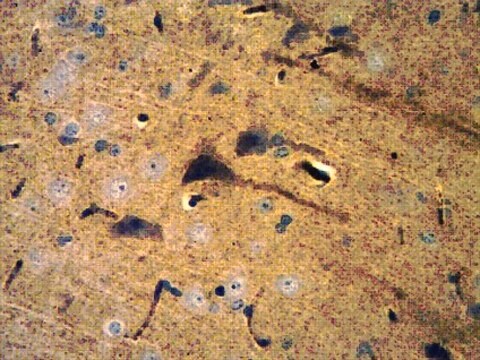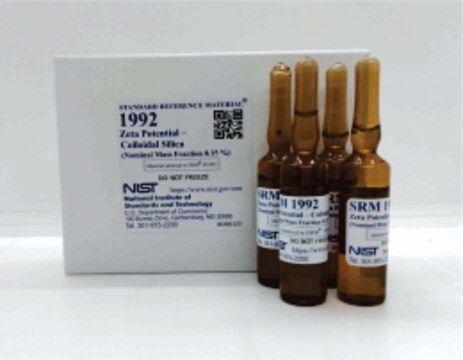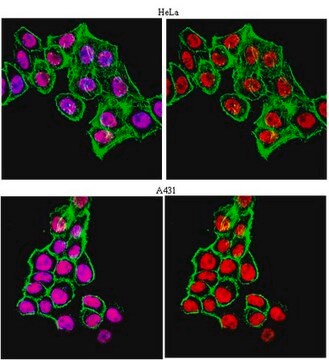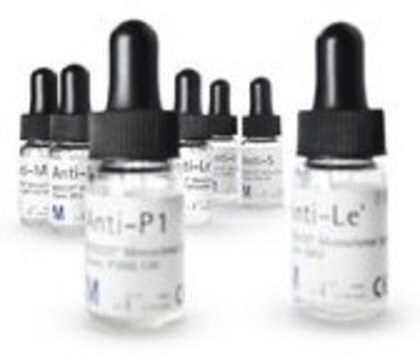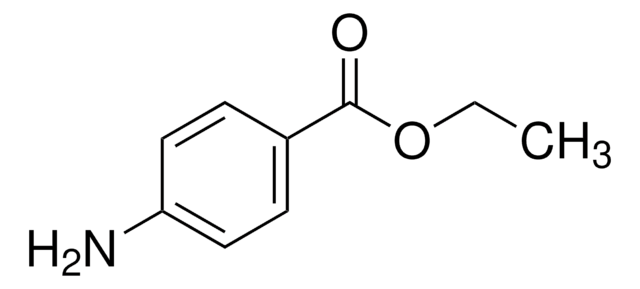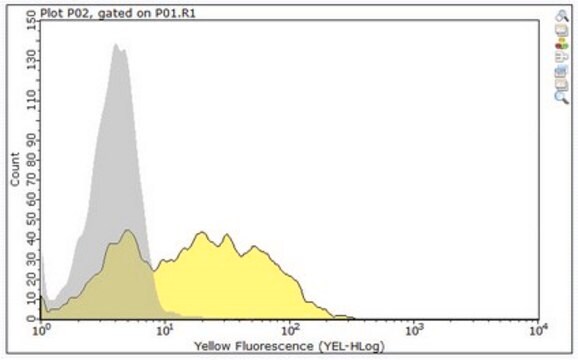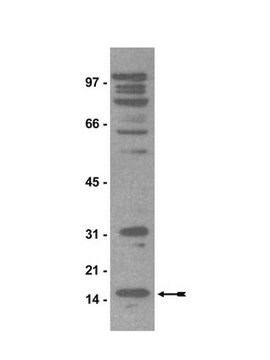추천 제품
생물학적 소스
rabbit
Quality Level
항체 형태
unpurified
항체 생산 유형
primary antibodies
클론
polyclonal
종 반응성
human
기술
ChIP: suitable
immunoprecipitation (IP): suitable
western blot: suitable
동형
IgG
NCBI 수납 번호
UniProt 수납 번호
배송 상태
ambient
타겟 번역 후 변형
unmodified
유전자 정보
human ... TDRD3(81550)
일반 설명
Tudor domain-containing protein 3 (UniProt: Q9H7E2; also known as TDRD3) is encoded by the TDRD3 gene (Gene ID: 81550) in human. TDRD3 belongs to an evolutionarily conserved family of 12 proteins (TDRD1-TDRD12) that contain one or more Tudor domains, which recognize symmetric dimethylarginine (sDMA) residues with the exception of TDRD3, which associates selectively with asymmetric dimethylarginine. TDRD3, in addition to its Tudor domain, contains a putative nucleic acid recognition motif and an ubiquitin-associated domain. Tudor domains are highly conserved throughout evolution: they can be found in virtually all organisms, from bacteria to mammals. TDRD3 has been reported in heart, brain, placenta, lung, liver, skeletal muscle, kidney, and pancreas. It is found both in the nucleus and in cytoplasm. In nucleus, it acts as a coactivator and recognizes and binds asymmetric dimethylation on the core histone tails. The Tudor domain specifically recognizes and binds asymmetric dimethylation of histone H3 ′Arg-17′ (H3R17me2a) and histones H4 ′Arg-3′, 2 tags for epigenetic transcriptional activation. In cytoplasm, it may play a role in the assembly and/or disassembly of mRNA stress granules and in the regulation of translation of target mRNAs by binding Arg/Gly-rich motifs (GAR) in dimethylarginine-containing proteins. TDRD3 is reported to act as a positive regulator of c-MYC gene transcription by recruiting topoisomerase IIIB (TOP3B) to the c-MYC gene promoter region via H4R3me2a recognition. Overexpression of TDRD3 gene has a strong predictive value for poor prognosis of estrogen receptor-negative breast cancers. (Ref.: Goulet, I et al. (2008). Hum. Mol. Genet. 17(19):3055-3074; Sikorsky, T et al. (2012). Nucleic Acids Res. 40(22):11748-55).
특이성
This polyclonal antibody detects the Tudor domain containing protein 3 in human. It targets an epitope within 258 amino acids in the C-terminal half.
면역원
Epitope: domain of:
GST-tagged recombinant fragment corresponding to 258 amino acids from the C-terminal half of human Tudor domain-containing protein 3.
애플리케이션
Anti-TDRD3, Cat. No. ABE1868, is a highly specific rabbit polyclonal antibody that targets Tudor domain-containing protein 3 and has been tested in Chromatin Immunoprecipitation (ChIP), Immunoprecipitation, and Western Blotting.
Research Category
Epigenetics & Nuclear Function
Epigenetics & Nuclear Function
Western Blotting Analysis: A 1:500 dilution from a representative lot detected TDRD3 in 20 µL of MCF7 cell lysate.
Immunoprecipitation Analysis: A representative lot detected TDRD3 in Immunoprecipitation applications (Yang, Y., et. al. (2014). Mol Cell. 53(3):484-97).
Chromatin Immunoprecipitation (ChIP) Analysis: A representative lot detected TDRD3 in Chromatin Immunoprecipitation applications (Yang, Y., et. al. (2014). Mol Cell. 53(3):484-97;Yang, Y., et. al. (2010). Mol Cell. 40(6):1016-23).
Immunoprecipitation Analysis: A representative lot detected TDRD3 in Immunoprecipitation applications (Yang, Y., et. al. (2014). Mol Cell. 53(3):484-97).
Chromatin Immunoprecipitation (ChIP) Analysis: A representative lot detected TDRD3 in Chromatin Immunoprecipitation applications (Yang, Y., et. al. (2014). Mol Cell. 53(3):484-97;Yang, Y., et. al. (2010). Mol Cell. 40(6):1016-23).
품질
Evaluated by Immunoprecipitation in MCF7 cell lysate.
Immunoprecipitation Analysis: 10 µg of this antibody immunoprecipitated TDRD3 in 500 µg of MCF7 cell lysate.
Immunoprecipitation Analysis: 10 µg of this antibody immunoprecipitated TDRD3 in 500 µg of MCF7 cell lysate.
표적 설명
~85 kDa observed; 73.18 kDa calculated. Uncharacterized bands may be observed in some lysate(s).
물리적 형태
Format: Unpurified
Rabbit polyclonal antiserum with 0.05% sodium azide.
Unpurified
저장 및 안정성
Stable for 1 year at -20°C from date of receipt.
Handling Recommendations: Upon receipt and prior to removing the cap, centrifuge the vial and gently mix the solution. Aliquot into microcentrifuge tubes and store at -20°C. Avoid repeated freeze/thaw cycles, which may damage IgG and affect product performance.
Handling Recommendations: Upon receipt and prior to removing the cap, centrifuge the vial and gently mix the solution. Aliquot into microcentrifuge tubes and store at -20°C. Avoid repeated freeze/thaw cycles, which may damage IgG and affect product performance.
기타 정보
Concentration: Please refer to lot specific datasheet.
면책조항
Unless otherwise stated in our catalog or other company documentation accompanying the product(s), our products are intended for research use only and are not to be used for any other purpose, which includes but is not limited to, unauthorized commercial uses, in vitro diagnostic uses, ex vivo or in vivo therapeutic uses or any type of consumption or application to humans or animals.
적합한 제품을 찾을 수 없으신가요?
당사의 제품 선택기 도구.을(를) 시도해 보세요.
Storage Class Code
12 - Non Combustible Liquids
WGK
WGK 1
Flash Point (°F)
Not applicable
Flash Point (°C)
Not applicable
시험 성적서(COA)
제품의 로트/배치 번호를 입력하여 시험 성적서(COA)을 검색하십시오. 로트 및 배치 번호는 제품 라벨에 있는 ‘로트’ 또는 ‘배치’라는 용어 뒤에서 찾을 수 있습니다.
Lifeng Huang et al.
Nucleic acids research, 46(6), 3061-3074 (2018-02-23)
DNA topoisomerase 3B (TOP3B) is unique among all mammalian topoisomerases for its dual activities that resolve both DNA and RNA topological entanglements to facilitate transcription and translation. However, the mechanism by which TOP3B activity is regulated is still elusive. Here
자사의 과학자팀은 생명 과학, 재료 과학, 화학 합성, 크로마토그래피, 분석 및 기타 많은 영역을 포함한 모든 과학 분야에 경험이 있습니다..
고객지원팀으로 연락바랍니다.